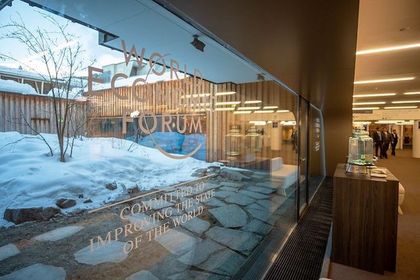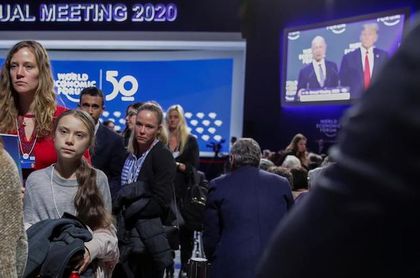World leaders gather to address technology and climate changes issues in the World Economic Forum, a meeting that “has become more political”, according to economic experts.
 The World Economic Forum Annual Meeting takes place in the Swiss town of Davos. / @wef_es.
The World Economic Forum Annual Meeting takes place in the Swiss town of Davos. / @wef_es.
The World Economic Forum Annual Meeting, which brings together political and economic leaders, is taking place in the Swiss town of Davos until January 24.
Klaus Schwab, founder and executive director of the World Economic Forum, wrote an article last December about this gathering, entitled What kind of capitalism do we want?
“Clearly, all companies should still seek to harness their core competencies and maintain an entrepreneurial mindset. But they should also work with other stakeholders to improve the state of the world in which they are operating. In fact, this latter proviso should be their ultimate purpose”, Schwab wrote as a conclusion.
The gathering will show to what extent this conclusion, or those derived from the forum itself, become binding, and generate consequences in the functioning of the free market.
TECHNOLOGY AND CLIMATE CHANGE
The precedents are not very convincing, because “in recent years, the ‘catwalk’ version of Davos has been reinforced much more than the real forum that many of us would like it to be”, Jorge Saguar, economist and member of the Spanish group Evangelicals in Economy and Business (Tres-e), told news website Protestante Digital.
In addition to high-profile interventions, such as the interim president of the National Assembly of Venezuela, Juan Guaidó, the activist Greta Thunberg or the US President Donald Trump, in this edition the event focus on issues such as data management, cybersecurity and action against climate change.
This focus on technology is also one of the key ways with which the Forum proposes to address the future of work.
“History suggests that if we leave it to the market, the Fourth Industrial Revolution will lead us to a long and damaging period of discontinuity”, the organisers pointed out.
 This year the Forum is discussing the meaning of capitalism. / @wef_es.
This year the Forum is discussing the meaning of capitalism. / @wef_es.
ECONOMIC SLOWDOWN OR NEW OPPORTUNITY?
The meeting in Davos comes with the fear of a possible economic slowdown, that would worsen this 2020.
The tensions between United States and China during the last year, despite the agreement they just signed to set aside the war of tariffs; the proposal of new types of taxes, such as the Google fee in France (also in suspension); and the growing tensions between the Islam and the West, with its impact on oil prices, are some of the issues the analysts says need to be addressed.
However, “there is also a second thorough point of view, which just sees this as a moment of search and decision making for new opportunities, to those who have sensitivity and know how to combine it with an adequate capacity of adaptation”, Saguar said.
“The global economy is evolving in growth. An uneven growth, as almost always, but a growth, after all”, he added.
‘RESETTING’ CAPITALISM
The World Economic Forum aims to stress the conclusions reached on August 19 by members of the powerful Business Roundtable, which brings together the managers of companies such as Apple, Google, Amazon, JP Morgan, Vanguard Group, Johnson & Johnson and Ford.
The 181 CEOs who signed the Business Roundtable statement, committed to “lead their companies to redefine the purpose of a corporation to promote an economy at the service of the entire population”.
“This is one of the most heard slogans this year in Davos, as a way of expressing the need to restart and bring the economy closer to the citizen-consumer and to society, discarding economic benefit as the sole objective and adopting a role of provider, not only of beneficiary”, Saguar explained, pointing to the concept of ‘resetting’ capitalism, coined by the editor of The Financial Times, Lionel Barber.
 Swedish activist Greta Thunberg listens to Donald Trump talk during the Forum. / @wef_es.
Swedish activist Greta Thunberg listens to Donald Trump talk during the Forum. / @wef_es.
TAKING CARE OF THE CONSUMER
“Participatory capitalism as a way of reversing the perception of growing inequalities that could put at risk the liberal democracies, evokes that protection and care of the consumers, necessary to guarantee a free market within the framework of which these great inequalities have been generated”.
That is why it is important to “transmit the idea of listening to and taking care of the consumer and society, as shareholders, to make them partakers of the strategic decisions of large companies, so that they maybe also participate decisively in every second of our lives”.
“The capitalism to which Milton Friedman, in a famous article published in September 1970 in The New York Times, assigned the only and unavoidable mission of increasing business profits, seems to be exhausted 50 years later”, Saguar underlined.
“MOST COUNTRIES WANT TO ATTRACT THE ATTENTION OF WORLD LEADERS”
The World Economic Forum Annual Meeting still has many unresolved expectations. Furthermore, economic analysts and experts do not like the fact that the gathering has become more political.
“Public relations, headlines and images of unity and cooperation, have become more important than taking important decisions for citizens. The assistance of executives and politicians, with all expenses paid, has increasingly grown, compared to shareholders or owners of large corporations, called to influence the economic history and lives of people”, Saguar explained.
During the first days of the Forum, the focus has been n the words of Trump, who said that “we must forget the apocalyptic messages”, alluding to Swedish activist Greta Thunberg, who had warned that “the CO2 emissions have not been reduced and this is precisely what we have to achieve”.
Saguar pointed out that “most of the countries are there because of the possibility of attracting the attention of world economic leaders, such as investors, especially large companies”.
As Schwab said in his article, in Davos “business leaders now have an incredible opportunity. By giving stakeholder capitalism concrete meaning, they can move beyond their legal obligations and uphold their duty to society”.
Furthermore, “they can bring the world closer to achieving shared goals, such as those outlined in the Paris climate agreement and the United Nations Sustainable Development Agenda. If they really want to leave their mark on the world, there is no alternative”.

Las opiniones vertidas por nuestros colaboradores se realizan a nivel personal, pudiendo coincidir o no con la postura de la dirección de Protestante Digital.
Si quieres comentar o